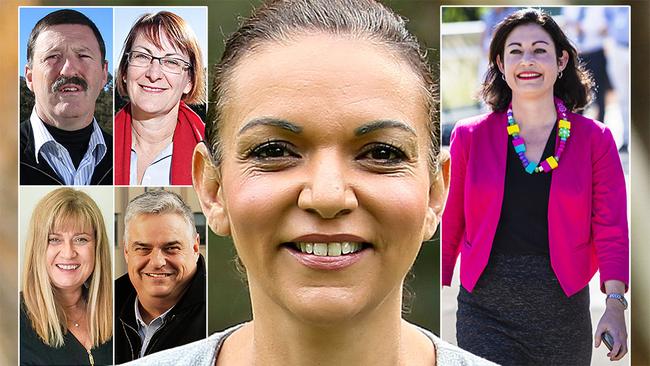Labor’s MPs brought to you by the Greens
A record number of Labor MPs will owe their seats in parliament to the Greens if Bill Shorten wins next Saturday’s election.

A record number of Labor MPs will owe their seats in parliament to the Greens if Bill Shorten wins next Saturday’s election, fuelling claims that the Opposition Leader will be “indebted” to the minor party.
Analysis by The Australian shows that 11 Labor MPs were gifted victory at the last election by the left-wing party despite being in a losing position before the final allocation of preferences.
Experts predicted yesterday that the number of Labor and Coalition MPs who would rely on minor-party preferences to overtake rival candidates at the May 18 election would increase.
The final round of preference distributions changed the outcome of electoral contests in favour of Labor candidates in 15 seats, while no Coalition MP secured a “come from behind” win following preference flows at the 2016 double-dissolution election.
A breakdown of Australian Electoral Commission data also shows that Clive Palmer’s elevation to parliament in 2013 was secured through Labor support, undermining Mr Shorten’s political attack on the Liberal Party for cutting a preference deal with the mining magnate.
At the 2013 election, Mr Palmer trailed by 14,509 votes in the Sunshine Coast seat of Fairfax before the final distribution of preferences, but was able to clinch victory by 53 votes, with 81 per cent of Labor preferences going his way.

Speaking in the marginal Liberal National Party-held seat of Petrie in Queensland yesterday, the Opposition Leader argued that a re-elected Coalition government could need to repay Mr Palmer for his support by reviving its now scrapped corporate tax cuts package — a claim rejected by Scott Morrison.
“Does anyone not really think that Mr Morrison doesn’t have one of the biggest IOU cheques in Australian political history to Clive Palmer if he gets returned?” Mr Shorten said.
Coalition campaign spokesman Simon Birmingham returned fire, saying that Labor’s reliance on Greens preferences to win 11 seats at the 2016 election revealed “how indebted Labor is to the minor party”.
“Last time the Labor-Greens alliance were in power, they weakened our borders, drove the budget into the red and weakened our economy,” Senator Birmingham said yesterday.
“Australia can’t afford another disastrous Labor-Green coalition. Bill Shorten must come clean on what promises have been made with the party that wants to end our alliance with the US, has voted against national security legislation, has a policy to reduce defence spending and even wants to bring in death taxes.”
Of the 15 Labor MPs at the 2016 election who came from behind on the last round of preference allocations to win their seats, 11 secured victory on the back of Greens preferences.
Two Queensland MPs — Cathy O’Toole in Herbert and Susan Lamb in Longman — were beneficiaries of One Nation preference flows; while in South Australia Steve Georganas won his electorate of Hindmarsh due to preferences from the Nick Xenophon Team, later rebranded as Centre Alliance.

Rebekha Sharkie, a member of NXT, won the South Australian seat of Mayo on Labor preferences while Labor’s David Feeney — who resigned last year after being unable to prove he was eligible for parliament under section 44 of the Constitution — won the Melbourne seat of Batman (now renamed Cooper) on the back of Liberal preferences.
John Wanna, a professor of politics at the Australian National University and Griffith University, said he believed more seats than in 2016 would have outcomes that hinged on the final distribution of preferences at next Saturday’s election.
“I think it’s going to be more than 20 seats this time where the person who wins the primary does not win the seat,” Professor Wanna said.
“The first reason is that the major parties are really on the nose. I’ve not met a single person in the last six months who are really wanting to vote for the Coalition or Labor. No one.
“Secondly, there is a major fragmentation of the parties … I think the preference flows may be instrumental.”
At the 2016 election, according to The Australian’s analysis of AEC data, there were 71 seats that were still undecided with one round of preference allocation to go. In 55 of those seats, the candidate who was in front at that point of the count went on to win.
But there were 16 seats where the candidate in front was defeated due to preferences breaking in favour of their opponent.
Only 48 MPs were elected with more than 50 per cent of the primary vote: 32 from the Coalition and 16 from Labor.
Professor Wanna said he would not be surprised if the Coalition won the election, telling The Australian:“I think the tide is turning”. He argued that Labor would need to pick up about eight seats in Victoria. “If they don’t win those seats in Victoria, they will not form government,” he said.
Professor Wanna also said the Coalition had a chance of winning two to three seats in Tasmania, a further seat in the Northern Territory, a seat in Western Australia and a seat in Brisbane.



To join the conversation, please log in. Don't have an account? Register
Join the conversation, you are commenting as Logout